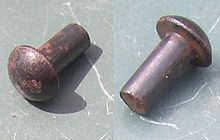rivet
Jump to navigation
Jump to search
See also: Rivet
English
[edit]Etymology
[edit]From Old French rivet (13th century), from the verb Old French river (“to fetter [a person]”) (12th century), from Old French rive (“rim, edge”) (ca. 1100), which is ultimately from Latin ripa (“riverbank”). Compare river, rival, riparian.
The sense "kind of footman's armour" is apparently a back-formation from almain rivet, which is apparently derived from the English noun; see that entry for more.
Pronunciation
[edit]Noun
[edit]rivet (plural rivets)

- A cylindrical mechanical fastener that attaches multiple parts together by fitting through a hole and deforming the head(s) at either end.
- (figuratively) Any fixed point or certain basis.
- (obsolete) A light kind of footman's plate armour; an almain rivet.
- 1550, Edward Hall, “(please specify the part of the work)”, in The Vnion of the Two Noble and Illustre Famelies of Lancastre & Yorke, Beyng Long in Continuall Discension for the Croune of this Noble Realme, […], London: […] Rychard Grafton, […] [and Steven Mierdman], →OCLC:
- over his rivet he had a garment of white cloth of gold with a redde crosse
- 1903, The Archaeological Journal, page 105:
- In 1579 it is mentioned that Almain rivets are now out of use, and in lieu of them a corselett shall be found. The rivets varied in cost; in 1509 they were to be had for 8s., in 1512 they were imported at 16s., and again in 1513 […]
Derived terms
[edit]Translations
[edit]cylindrical mechanical fastener
|
Verb
[edit]rivet (third-person singular simple present rivets, present participle riveting or rivetting, simple past and past participle riveted or rivetted)
- (transitive) To attach or fasten parts by using rivets. [from early 15th c.]
- (transitive) To install rivets.
- (transitive, figurative) To command the attention of. [from c. 1600]
- 1912 October, Edgar Rice Burroughs, “Tarzan of the Apes”, in The All-Story, New York, N.Y.: Frank A. Munsey Co., →OCLC; republished as chapter 6, in Tarzan of the Apes, New York, N.Y.: A. L. Burt Company, 1914 June, →OCLC, furnishings and other contents of the room it was which riveted his attention. He examined many things minutely — strange tools and weapons, books, paper, clothing — what little had withstood the ravages of time in the humid atmosphere of the jungle coast./mode/1up pages The furnishings and other contents of the room it was which riveted his attention. He examined many things minutely — strange tools and weapons, books, paper, clothing — what little had withstood the ravages of time in the humid atmosphere of the jungle coast.:
- (transitive, figurative) To make firm or immovable.
- Terror riveted him to the spot.
Translations
[edit]to attach or fasten parts by using rivets
|
to install rivets
to command the attention of spectators
- The translations below need to be checked and inserted above into the appropriate translation tables. See instructions at Wiktionary:Entry layout § Translations.
Translations to be checked
|
See also
[edit]Further reading
[edit]Anagrams
[edit]Catalan
[edit]Etymology
[edit]Borrowed from Andalusian Arabic رِبَاط (ribát), from Arabic رِبَاط (ribāṭ, “something which binds”).
Pronunciation
[edit]Noun
[edit]rivet m (plural rivets)
- weather strip, draught excluder
- edging, piping
- (in the plural) hints, traces
- 1898, Marià Vayreda, Recorts de la darrera carlinada:
- Ara, ab més reflexió, trobo que fou senzillament un acte de cobardía ab ribets de personal egoisme.
- Now, after more reflection, I find that it was simply and act of cowardice with traces of personal egoism.
Derived terms
[edit]Further reading
[edit]- “rivet” in Diccionari de la llengua catalana, segona edició, Institut d’Estudis Catalans.
French
[edit]Etymology
[edit]Pronunciation
[edit]Noun
[edit]rivet m (plural rivets)
- rivet (mechanical fastener)
Further reading
[edit]- “rivet”, in Trésor de la langue française informatisé [Digitized Treasury of the French Language], 2012.
Latin
[edit]Verb
[edit]rīvet
Swedish
[edit]Noun
[edit]rivet
Categories:
- English terms derived from Old French
- English terms derived from Latin
- English back-formations
- English 2-syllable words
- English terms with IPA pronunciation
- English terms with audio links
- Rhymes:English/ɪvət
- Rhymes:English/ɪvət/2 syllables
- English lemmas
- English nouns
- English countable nouns
- English terms with obsolete senses
- en:Armor
- English terms with quotations
- English verbs
- English transitive verbs
- English terms with usage examples
- en:Fasteners
- Catalan terms borrowed from Andalusian Arabic
- Catalan terms derived from Andalusian Arabic
- Catalan terms derived from Arabic
- Catalan terms with IPA pronunciation
- Catalan lemmas
- Catalan nouns
- Catalan countable nouns
- Catalan masculine nouns
- Catalan terms with quotations
- ca:Clothing
- ca:Construction
- French terms derived from Latin
- French 2-syllable words
- French terms with IPA pronunciation
- French terms with audio links
- French lemmas
- French nouns
- French countable nouns
- French masculine nouns
- Latin non-lemma forms
- Latin verb forms
- Swedish non-lemma forms
- Swedish noun forms